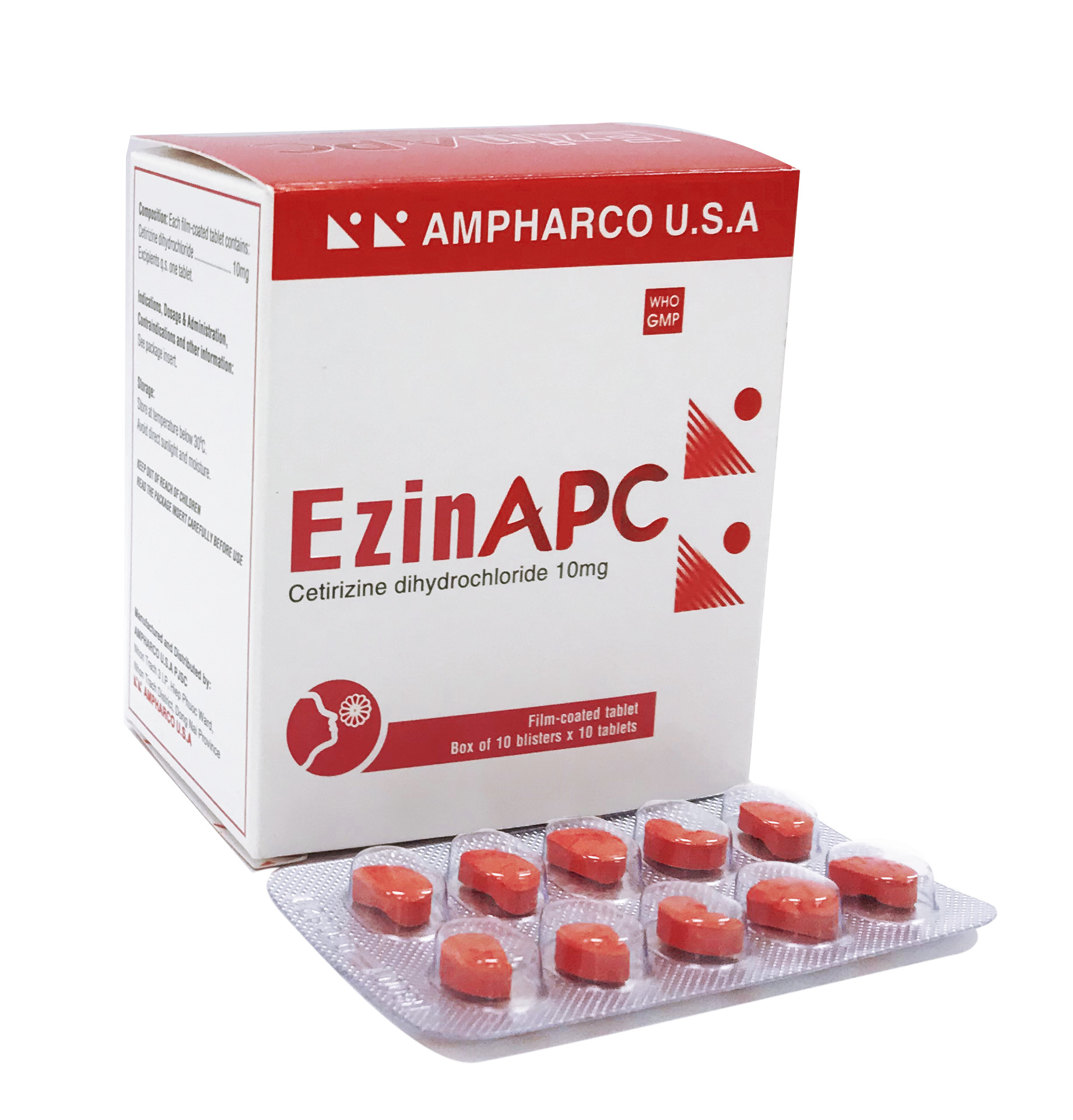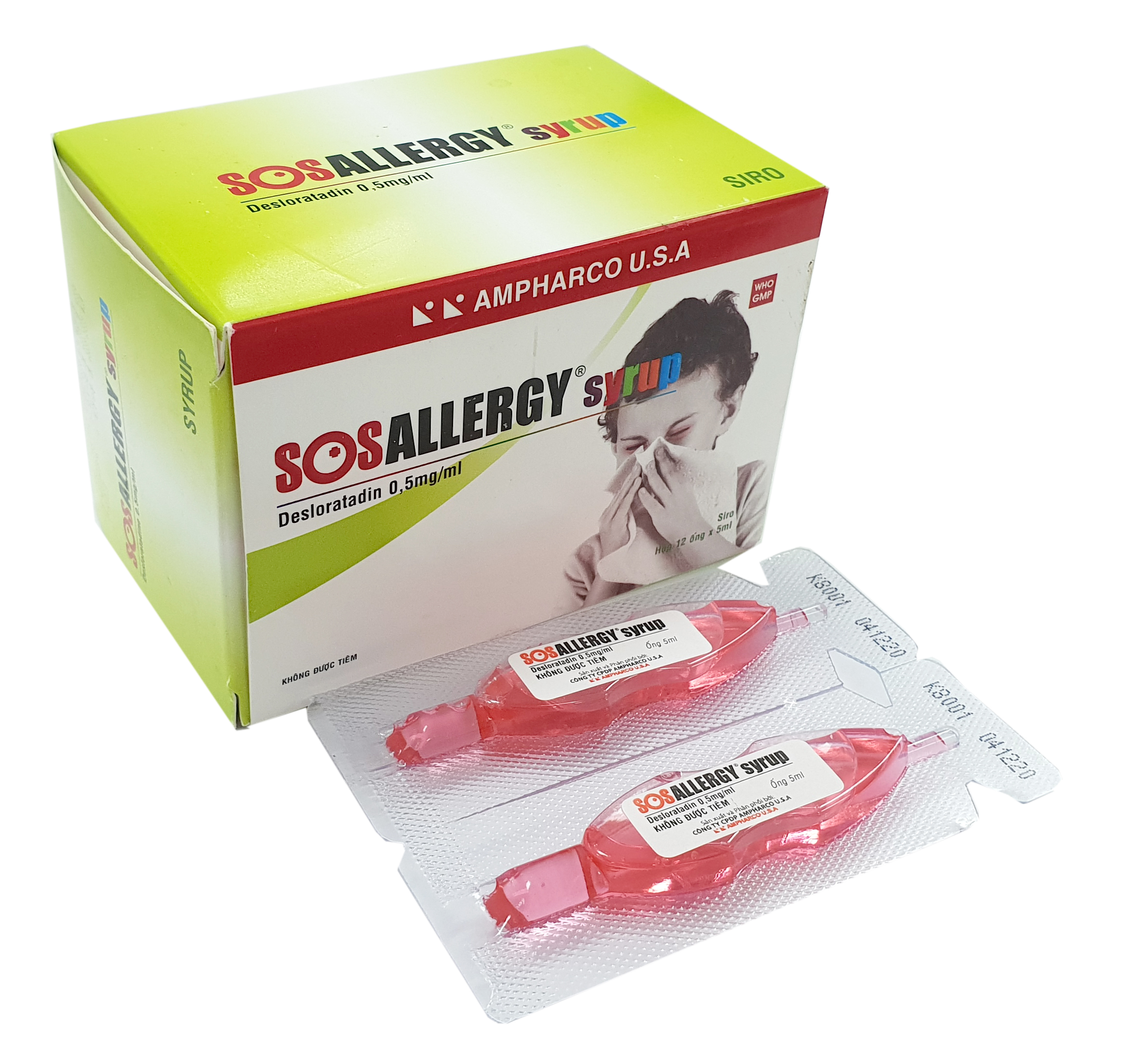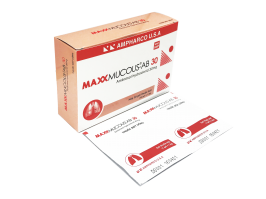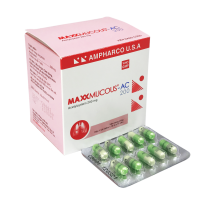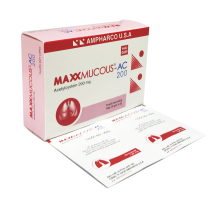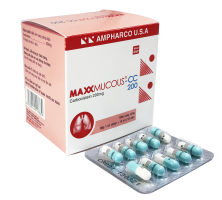MAXXMUCOUS–AB® 30 oral powder is used as a mucolytic in acute and chronic diseases of the respiratory tract accompanied by abnormal bronchial secretions, particularly in exacerbation of chronic bronchitis, bronchial asthma.
Specifications
MAXXMUCOUS®-AB 30
Ambroxol hydrochloride 30 mg
Composition: Each film-coated tablet contains:
Ambroxol hydrochloride............................ 30 mg
Excipients: Lactose; Microcrystalline cellulose; Sodium starch glycolate; Magnesium stearate; Talc; Opadry II white; Yellow iron oxide; Red iron oxide.
Presentation:
Blister of 10 tablets. Box of 1 blister, 3 blisters or 10 blisters.
- Properties
Pharmacodynamics:
ATC code: R05CB06
Ambroxol is a metabolite of bromhexine, and has the effects and uses as bromhexine. Ambroxol makes phlegm in the airways thinner and less sticky so that the phlegm is removed from the airway more easily. Therefore, it has an expectorant property. Some studies showed that ambroxol improves in symptoms and reduces the number of acute exacerbations of severe chronic obstructive pulmonary disease.
The results of recent studies show that ambroxol has anti-inflammatory and antioxidant properties. In addition, ambroxol also works as local anesthetic by blocking sodium channel in the cell membrane. Ambroxol can stimulate the synthesis and secretion of alveolar surfactant. The drug was considered as a promoter alveolar surfactant. However, this medicinal product is not effective when administered to the mother for preventing respiratory distress syndrome in infants, but it is modestly effective for early treatment for affected infants.
Ambroxol has also the effect of uric acid secretion in the urine, this effect depends on the dose. Minimum effective dose reduced plasma uric acid around 250-500 mg/day in 2 divided doses. High doses are well tolerated up to 1g.
Pharmacokinetics:
Ambroxol is rapidly absorbed after oral administration. It is diffused rapidly from blood to tissue with maximum concentration in lung tissue. Bioavalaibility is approximately 70%. Maximum plasma concentration is reached in 0.5-3 hours. About 90% of therapeutic dose is bound to serum proteins.
Half-life is 7-12 hours.
Ambroxol is metabolized principally in the liver.
83% of the dose is excreted by renal secretion.
- Indications
MAXXMUCOUS®–AB 30 film-coated tablet is used as a mucolytic in acute and chronic diseases of the respiratory tract accompanied by abnormal bronchial secretions, particularly in exacerbation of chronic bronchitis, bronchial asthma.
- Dosage and administration
To be taken with liquid after meals.
Adults and children > 10 years: 30-60 mg, 2 times daily.
Children 5-10 years: 15-30 mg, 2 times daily.
- Contraindications
- Hypersensitive to ambroxol or any drug components.
- Active peptic ulcer.
- Warning and precautions
Caution should be exercised in patients with peptic ulcers and those with hemoptysis because ambroxol can lyse fibrin coagulates and therefore recurrent bleeding.
This medicine contains lactose. Patients with rare hereditary problems of galactose intolerance, the Lapp lactase deficiency or glucose-galactose malabsorption should not take this medicine.
- Pregnancy
No evidence of ill effects due to use of drug during pregnancy. However, the drug should be used with caution during the first trimester of pregnancy.
- Breast-feeding
No data available on bromhexine and ambroxol concentration in breast milk.
- Effects on ability to drive and use machines
Ambroxol either does not affect or has only negligible impact on ability to drive vehicles and operate machines.
Drug interactions
Administration of ambroxol together with antibiotics (amoxycillin, cefuroxime, erythromycin, doxycycline) leads to higher antibiotic concentration in the lung tissue.
Ambroxol should not be co-administered with an antitussives (eg, codeine) or a drying out phlegm agent (eg atropine). This co-administarion is unreasonable.
Adverse drug reactions (ADR)
Ambroxol is generally well tolerated.
Common, ADR ≥ 1/100
Gastrointestinal: mild side effects, such as pyrosis, dyspepsia, and occasionally nausea, vomiting.
Less common, 1/1000 ≤ ADR <1/100
Allergic reactions, primarily skin rashes.
Rare, ADR< 1/1000
Severe acute anaphylactic-type reactions, but relationship to ambroxol is uncertain, dry mouth and elevated transaminases.
Instructions about how to manage adverse drug reactions
Interrupt the treatment if necessary.
Overdose and treatment
No symptoms of overdosage have been reported to date. If they occur, stop using the drug and symptomatic treatment should be provided.
Keep out of reach of children
Read the package insert carefully before use.
Ask your doctor for further information
Manufactured and distributed by: AMPHARCO U.S.A – Pharmaceutical Joint-Stock Company
Nhon Trach 3 IP, Hiep Phuoc ward, Nhon Trach district, Dong Nai, Vietnam
Tel: 02513 566 202 - Fax: 02513 566 203



